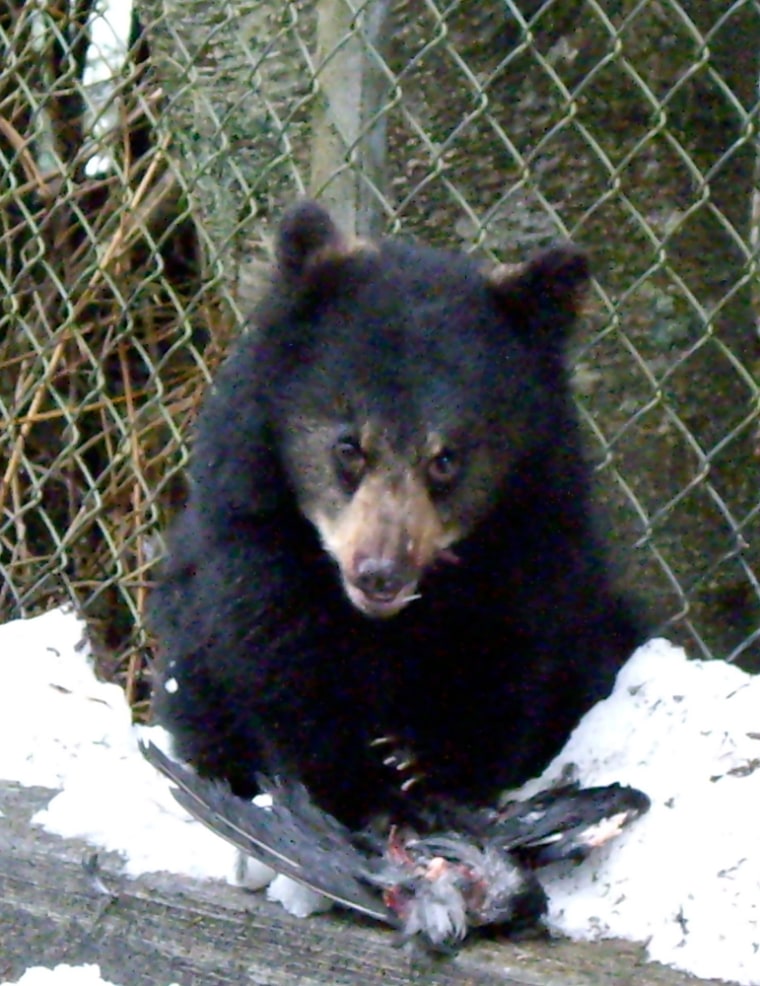The little bear scampering through back yards should be snug in its den, curled up beside its mother and sleeping away the harsh Alaska winter. Instead, the orphaned bear cub is prowling back yards on Douglas Island near Juneau, scrounging for anything to eat, dog food, bird seed, dead crows.
The tiny bear scored big at Brenda Greenbank and Gary Rosenberger's beachfront home. Gary saw the cub for the first time a couple of days before Christmas after returning with deer from a hunting trip.
"He went out to the garage and thought he saw a dog carrying away a front quarter. He followed it a bit and realized it was a tiny bear," Brenda said.
The next time Gary had a close encounter with the bear was when he was putting meat scraps for gulls and eagles in a tin atop the wood pile.
"The wood pile is just outside the front door. When he reached out to put another handful in there, he just about touched that guy because he had his face buried in that pan," Brenda said. "The little guy had crawled up on the wood pile and helped himself."
While Rosenberger has seen the bear several times, Greenbank saw it just once. She estimates its size at about 25 pounds — the size of a small dog.
"He is just a little black fuzzball," she said. "I just can't see him surviving without a mother to protect him ... but miracles have happened."
Grant Hilderbrandt, a regional supervisor for the Division of Wildlife Conservation, said if the cub isn't captured, his chances of surviving are poor.
"Being an orphan, his chances are not very good to start with," he said. "It's a hard life out there."
Black bears in southeast Alaska normally go into hibernation in late October or early November, with pregnant sows typically going in first. No one really knows for sure what triggers the need to hibernate but it probably has to do with the weather getting colder and food scarcer, Hilderbrandt said.
Black bears do not go into a deep sleep, he said. They doze, sometimes getting up and going outside the den.
"They are asleep but not completely out. They get up and move around and nuzzle the cubs, but it is a very relaxed state," Hilderbrandt said.
Hibernation is nature's way of conserving energy. During hibernation, the heart rate goes from between 60 and 100 beats per minute to between 8 and 10 beats. Body temperature, normally between 96 and 100 degrees, drops to 88 degrees.
During hibernation, bears lose up to 40 percent of their body weight.
Black bear sows give birth in hibernation, typically two to four cubs. She remains with her cubs for a couple of years, preparing the den the next winter.
That's where this little bear cub was left out in the cold. Without a mother, it's possible it just doesn't know what to do.
The orphan probably wasn't in good shape going into the winter because it was without its mother, Hilderbrandt said. That could be one reason for why it isn't hibernating.
"When a bear is in poor shape it tends to stay out longer looking for food," he said.
A live trap was set up Thursday at Gary and Brenda's home to try and catch the fuzzball.
The plan is to move the cub to a remote location off the island where it will be introduced to a denning box made of wood. The box will be filled with a nice straw bed, perhaps a good place to sleep away the rest of the winter.
"Hopefully it will come by tonight and amble over to the trap and go in for a meal and we'll trap it," said Neil Barten, area wildlife management biologist on Douglas Island.
Apples and cinnamon are being used to lure the cub into the trap.
"Basically, it smells like Thanksgiving," Barten said.
